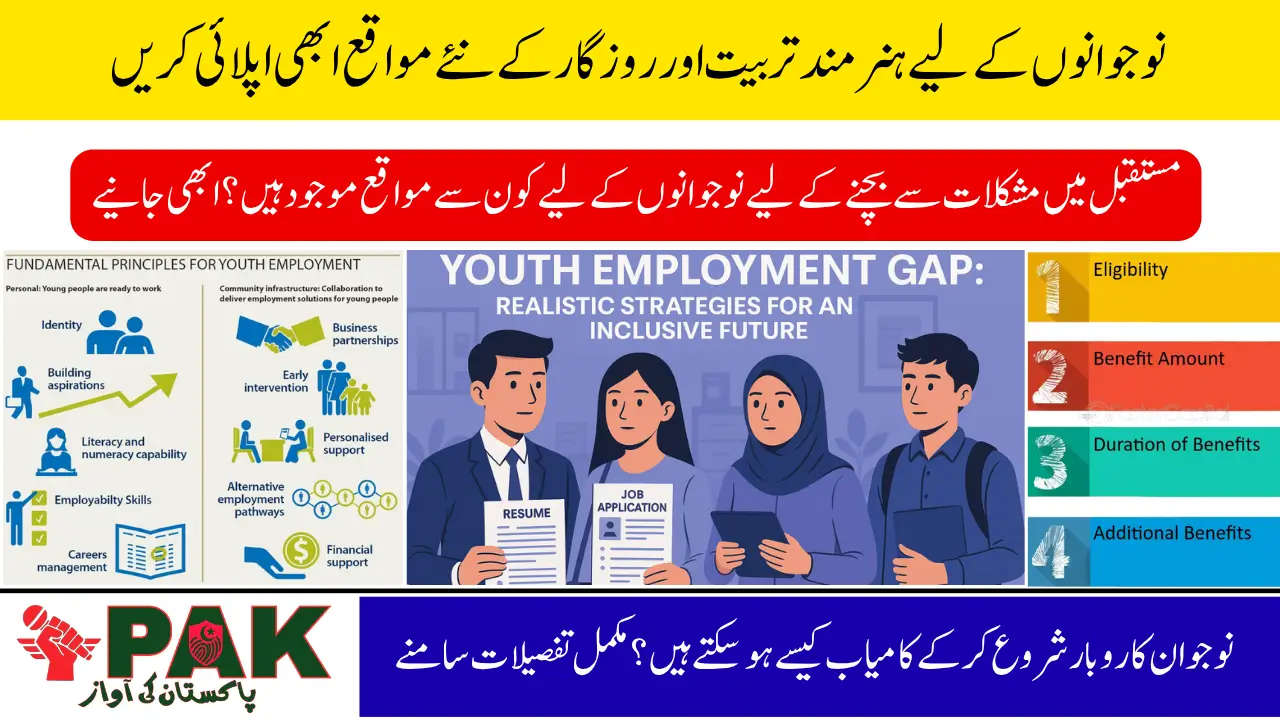Introduction National Youth Employment Policy
Youth unemployment remains one of the most pressing socio-economic issues globally. A growing number of young people are entering the labor market each year, yet many face barriers such as limited work experience, inadequate skills, and mismatched qualifications compared to market demands. Additionally, rapid technological change, economic instability, and limited access to decent job opportunities further exacerbate the situation. Prolonged unemployment among youth not only hinders personal development and economic independence but also contributes to social exclusion, poverty, and instability.

A National Youth Employment Policy provides a strategic framework to address these challenges by aligning education, skills development, and labor market needs. It ensures coordinated action among government institutions, the private sector, and civil society to create sustainable job opportunities. By focusing on employability, entrepreneurship, and inclusive growth, such a policy plays a crucial role in harnessing the demographic dividend, reducing unemployment, and fostering social and economic development.
You Can Also Read: Benazir Kafalat 13500 Payment Withdrawal 2025 Through Registered Banks New Update
Understanding the National Youth Employment Policy
The National Youth Employment Policy is a government strategy designed to address youth unemployment and create decent job opportunities. It focuses on improving employability, promoting entrepreneurship, and linking education with labor market needs. By aligning skills development with industry demands, the policy ensures young people gain the right training and opportunities to succeed in the workforce.
- Provides a clear framework to tackle youth unemployment challenges.
- Promotes skills training and education aligned with market needs.
- Encourages entrepreneurship and innovation among young people.
- Strengthens collaboration between the government, the private sector, and civil society.
- Ensures equal access to opportunities for all youth.
The National Youth Employment Policy empowers youth through skills, jobs, and opportunities.
You Can Also Read: Benazir Income Support Programme News For 2025 New Installment 13500 Latest Update
Major Strategies to Tackle Youth Unemployment
Skill development is one of the most effective ways to reduce youth unemployment. Training programs that focus on technical, vocational, and soft skills prepare young people for current and future labor market demands. By aligning education with industry requirements, governments can bridge the gap between skills and available jobs.
- Establish vocational training centers across regions.
- Update curricula to match evolving market needs.
- Promote apprenticeships and hands-on learning opportunities.
Encouraging Entrepreneurship and Startups
Youth entrepreneurship plays a vital role in job creation. By supporting young entrepreneurs with resources, mentorship, and financial access, governments and stakeholders can empower them to launch startups and create employment for others.
- Provide startup funding and microfinance opportunities.
- Offer mentorship and incubation programs.
- Reduce regulatory barriers for young entrepreneurs.
Strengthening Public-Private Partnerships
Collaboration between the government, the private sector, and civil society is crucial for sustainable employment opportunities. Public-private partnerships (PPPs) help create training programs, internships, and job placements tailored to market demands.
- Partner with industries to design skill-based curricula.
- Expand internship and apprenticeship programs.
- Invest jointly in youth employment initiatives.
Expanding Access to Digital Jobs and Remote Work
The digital economy provides new pathways for youth employment. Expanding access to remote work, freelancing platforms, and digital jobs enables young people to engage in global opportunities while overcoming geographical barriers.
- Provide digital literacy and ICT training.
- Improve internet infrastructure and affordability.
- Support youth participation in online freelancing platforms.
Enhancing Job Placement and Career Guidance Services
Effective career guidance and job placement services help youth transition smoothly into the workforce. By connecting job seekers with employers, career centers can reduce unemployment and underemployment.
- Establish youth-friendly job placement centers.
- Offer career counseling and mentorship programs.
- Create online job portals with verified opportunities.
These strategies empower youth with skills, resources, and opportunities, driving sustainable job creation and economic growth.
You Can Also Read: Benazir Income Support Programme News For 2025 New Installment 13500 Latest Update
Opportunities Created by the Policy
The National Youth Employment Policy creates new opportunities for young people by connecting them with skills, jobs, and entrepreneurship pathways. It empowers youth to participate in the economy, reduces unemployment, and promotes innovation. With strong support from the government, the private sector, and civil society, the policy ensures inclusive growth and equal access to opportunities.
- Access to skill development and vocational training programs.
- Increased support for startups and youth-led businesses.
- More digital and remote job opportunities.
- Stronger linkages between education and the labor market.
- Enhanced career guidance, counseling, and job placement services.
The policy opens doors for youth to build skills, start businesses, and secure decent jobs.
You Can Also Read: BISP Quarterly Payment Increase 2025 From 10500 To 13500 Who Is Eligible To Get Payment
Challenges in Implementing the Policy
Implementing the National Youth Employment Policy is not without obstacles. Despite its strong framework, several challenges can slow down progress. These include limited resources, weak coordination among stakeholders, and gaps between training and market demands. Addressing these issues is crucial to ensuring that youth fully benefit from the opportunities created.
- Insufficient funding and budget allocation for youth programs.
- Lack of coordination between the government, the private sector, and civil society.
- Skill gaps due to outdated curricula and limited training facilities.
- Unequal access to opportunities for rural and marginalized youth.
- Limited monitoring and evaluation mechanisms to track progress.
Effective implementation requires strong funding, coordination, and inclusive strategies.
You Can Also Read: BISP Quarterly Payment Increase 2025 From 10500 To 13500 Who Is Eligible To Get Payment
The Role of Stakeholders in Policy Success
The success of the National Youth Employment Policy depends on the active involvement of multiple stakeholders. Government, private sector, civil society, educational institutions, and youth themselves must work together to create sustainable solutions. Each plays a unique role in ensuring the policy translates into real opportunities and long-term impact.
- Government: Provides policy direction, funding, and regulatory frameworks.
- Private Sector: Generates jobs, invests in skills training, and supports entrepreneurship.
- Educational Institutions: Align curricula with labor market needs and promote vocational training.
- Civil Society: Advocates for inclusive programs and supports marginalized youth.
- Youth: Actively participate in training, innovation, and entrepreneurship initiatives.
Strong collaboration among stakeholders ensures the policy delivers real youth employment outcomes.
You Can Also Read: Maryam Nawaz Loan Scheme Of Upto 30 Million For Small And Medium-sized Businesses In 2025
Future Outlook for Youth Employment
The future of youth employment depends on how effectively policies adapt to changing economic, technological, and social trends. With rapid digitalization, green jobs, and global opportunities emerging, young people can access new pathways to sustainable employment. However, success will require continuous investment in skills, innovation, and inclusive policies that leave no youth behind.
- Growth of digital jobs and remote work opportunities.
- Expansion of green and sustainable employment sectors.
- Greater focus on entrepreneurship and youth-led startups.
- Increased role of technology and artificial intelligence in the labor market.
- Stronger global and regional cooperation for youth employment initiatives.
The future of youth employment is shaped by skills, innovation, and inclusive growth.
You Can Also Read: Maryam Nawaz Loan Scheme Of Upto 30 Million For Small And Medium-sized Businesses In 2025
Conclusion
Youth unemployment remains one of the most pressing challenges of our time, affecting not only individual livelihoods but also national development and social stability. The National Youth Employment Policy provides a structured framework to address these challenges by promoting skills development, entrepreneurship, digital opportunities, and stronger partnerships between stakeholders. By focusing on both immediate and long-term solutions, the policy aims to empower young people to contribute meaningfully to the economy and society.
Looking ahead, the success of this policy will depend on effective implementation, adequate funding, and inclusive strategies that reach all youth, including those in rural and marginalized communities. With coordinated action from the government, the private sector, civil society, and the youth themselves, the policy can transform challenges into opportunities. A strong commitment to innovation, skills, and equity will ensure a brighter and more sustainable future for young people.
You Can Also Read: BISE Lahore 1st Year Result 2025 Live Updates and Check Digitally Now
Common Questions
What is the National Youth Employment Policy?
It is a government framework designed to reduce youth unemployment by promoting skills development, entrepreneurship, and job creation.
Why is youth employment important?
Youth employment is vital for economic growth, poverty reduction, and social stability. It also empowers young people to become self-reliant and innovative.
How does the policy support young entrepreneurs?
The policy provides access to startup funding, mentorship, incubation programs, and training to help youth launch and grow businesses.
What role does technology play in youth employment?
Technology creates new job opportunities in digital work, freelancing, and remote employment, making it easier for youth to access global markets.
Who are the main stakeholders in the policy?
The key stakeholders include government, private sector, civil society, educational institutions, and youth themselves, all working together for policy success.
You Can Also Read: BISE Lahore 1st Year Result 2025 Live Updates and Check Digitally Now








